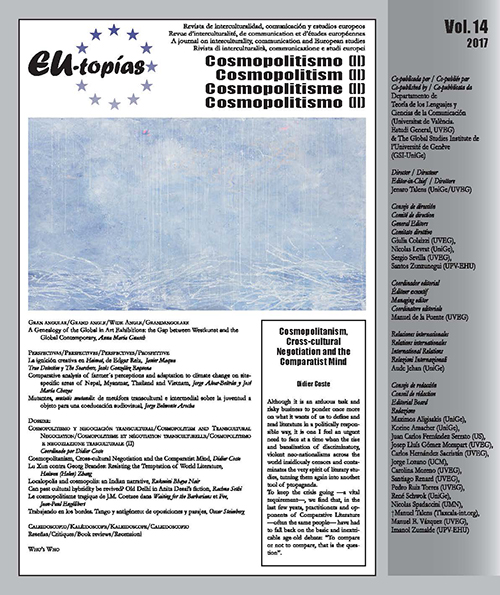L’ibridità culturale del passato può essere rianimata? La vecchia Delhi nella finzione di Anita Desai
DOI:
https://doi.org/10.7203/eutopias.0.18599Parole chiave:
Anita Desai, Clear Light of Day, In Custody, spatiality, social processes, cultural hibridity Abstract
Abstract
Questo articolo esplora la relazione dinamica tra spazialità e processi sociali nella città, gli “spazi vissuti” negoziati da scrittori/personaggi/lettori. Si concentra su Shahjahanabad/Old Delhi e il suo passato grandioso di ricche tradizioni storiche, linguistiche e poetiche con riferimento ai romanzi di Anita Desai, Clear Light of Day e In Custody, e svela i collegamenti tra la città reale e quella fittizia. La città di Mughal era famosa non solo per la sua magnificenza architettonica, ma anche per la sua cultura composita e per i suoi intenditori d’arte. Le forze storiche hanno distrutto fisicamente la città, smantellato la sua vita culturale e, nel processo, ne hanno strangolato l’anima. I due romanzi invocano ripetutamente la nostalgia per la grandezza e l’armonia del passato, e l’articolo suggerisce la necessità di andare oltre il lutto per le tradizioni perdute nel testo e fuori da esso, per i cittadini-lettori; fa riferimento, inoltre, alla possibilità dell’ibridismo culturale nelle spazialità trasformate.
 Downloads
Downloads
 Riferimenti bibliografici
Riferimenti bibliografici
Ahmad, Aijaz (1996) Lineages of the Present: Political Essays. New Delhi: Tulika.
Ali, Ahmed. [1940].Twilight in Delhi. New Delhi: Rupa, 2007.
Arasteh, P, and H. Pirnajmuddi (2014). “The Mimic (Wo)man ‘Writes Back’: Anita Desai’s In Custody”. International Letters of Social and Humanistic Sciences 16 (1) () 57-66. Retrieved from www.ilshs.pl on November 30, 2016
Barthes, Roland (1997). “Semiology and the Urban.” N. Leach(ed.) Rethinking Architecture: A Reader in Cultural Theory. London and New York: Routledge. 166-72.
Benjamin, Walter (1986). “A Berlin Chronicle.” in P. Demetz (Ed.) Reflections: Essays, Aphorisms, Autobiographical Writings. New York: Schocken. 3-60.
Bruschi, Isabella (2001). Partition in Fiction: Gendered Perspectives. New Delhi: Atlantic Publishers.
De Certeau, Michel (1984). The Practice of Everyday Life. Berkeley, CA: University of California Press.
Desai, Anita (1980). Clear Light of Day. New Delhi: Penguin.
— (1984) In Custody. New Delhi: Random House, 2008.
Foucault, Michel (1986). “Of other spaces” Diacritics 16/1 (): 22- 27.
Gee, M. (2004). “Anita Desai in conversation with Maggie Gee.” Wasafiri, 19.42 () 7-11. 7.
Guignery V. and T. Alexis (2009). “In Custody and beyond: A Conversation with Anita Desai”. Études anglaises, 3/2009 (Vol. 62), p. 370-378.
Kostof, Spiro (1991). The City Shaped: Urban Patterns and Meanings Through History. Boston: Little, Brown.
Lefebvre, Henri (1974). The Production of Space. Oxford:Basil Blackwell, 1991.
Nath, D. (2014). “Shahjahanabad Redevelopment Plan Stuck in Limbo.” The Hindu. 14 September.
Park, R.E. (1967 [1925]) “The City: Suggestions for the Investigation of Human Behavior in the Urban Environment.” R. E. Park et al(eds.) The City. Chicago: University of Chicago Press. 1-46.
Tan, Tai Yong and Kudaisya, Gyanesh (2000). The Aftermath of Partition in South Asia. Routledge: London and New York.
Tönnies, Ferdinand (1955). Community and Society. London: Routledge and Kegan Paul.
Uniyal, Ranu (2000) The Fiction of Margaret Drabble and Anita Desai: Women and Landscape. New Delhi: Creative Books.
Varma, Pavan K. (1989). Ghalib: The Man, the Times. New Delhi: Viking.
Wirth-Nesher, Hana (1996). City Codes: Reading the Modern Urban Novel. Cambridge: Cambridge University Press.
Yaquin, A. (2004). “The Communalization and Disintegration of Urdu in Anita Desai’s In Custody.” Annual of Urdu Studies vol. 19 . 120-141.
Downloads
Pubblicato
Come citare
-
Abstract240
-
PDF 77
Fascicolo
Sezione
Licenza
![]()
Tutti i contenuti pubblicati in EU-topías. Rivista di interculturalità, communicazione e studi europei è concesso in licenza Creative Commons Attribution-NonCommercial-ShareAlike 4.0. Il testo completo della licenza è disponibile all’indirizzo http://creativecommons.org/licenses/by-nc-sa/4.0
Essi possono essere copiati, utilizzati, diffusi, trasmessi e visualizzati pubblicamente, a condizione che ciò avvenga:
- Viene citata la paternità e la fonte originale della pubblicazione (rivista, editore e URL dell’opera).
- Non vengono utilizzati per scopi commerciali.
- L’esistenza e le specifiche di questa licenza d’uso sono menzionate.



